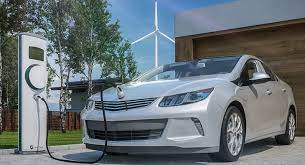Do electric cars increase your electric bill? This is a common question that arises when people consider making the switch to electric vehicles (EVs). In this article, we will delve into the factors that influence the cost of charging an electric car and provide insights into whether it truly affects your monthly electric expenses.
Understanding Electric Car Charging
One of the key considerations when assessing whether electric cars impact your electric bill is to understand how these vehicles are charged. Electric cars are typically charged through electric vehicle supply equipment (EVSE), commonly known as charging stations. There are several ways to charge an EV:
- Home Charging: This is the most convenient and common way to charge an electric car. Home charging stations, also known as Level 2 chargers, are installed in your home, allowing you to charge your EV overnight. The electricity consumed during charging will contribute to your electric bill.
- Public Charging: Public charging stations are available at various locations, such as shopping centers, parking lots, and highways. These chargers can be free or require payment, which may impact your electric bill if you frequently use them.
- Fast Charging: Fast charging stations provide a rapid charge to your electric car, allowing you to get back on the road quickly. However, fast charging may be more expensive than home charging.
Factors Influencing Electric Car Charging Costs
Several factors can influence the cost of charging your electric car and, consequently, your electric bill:
- Electricity Rates: The cost of electricity varies depending on your location and utility provider. Some areas have lower electricity rates, making it more cost-effective to charge your electric car.
- Charging Time: The time of day when you charge your electric car can affect the cost. Some utility companies offer time-of-use (TOU) rates, with lower prices during off-peak hours. Charging during these hours can help save money.
- Battery Size: The size of your electric car’s battery affects the amount of electricity it requires for a full charge. Larger batteries may result in higher charging costs.
- Charging Speed: The charging speed of your EV can vary, with Level 1 chargers being slower and Level 3 fast chargers being faster. Faster charging may cost more due to increased electricity consumption.
- Frequency of Charging: How often you charge your electric car also impacts your electric bill. Frequent charging, especially at public charging stations, can add up.
Do Electric Cars Increase Your Electric Bill?
The short answer is that electric cars can increase your electric bill, but the extent of the increase depends on various factors. To determine the actual impact on your electric expenses, you should consider the following:
- Charging Location: If you primarily charge your electric car at home, the impact on your electric bill may be less noticeable, especially if you take advantage of lower TOU rates. On the other hand, frequent use of public charging stations can lead to a more substantial increase in your electric bill.
- Energy Efficiency: Newer electric car models are designed to be more energy-efficient, helping you save on charging costs. Pay attention to the miles per kilowatt-hour (kWh) rating of your EV, as it can provide insight into its energy efficiency.
- Charging Habits: Be mindful of your charging habits. If you regularly top up your battery, even if it’s not necessary, it can lead to unnecessary expenses.
- Government Incentives: Many regions offer incentives for electric vehicle owners, such as tax credits or reduced electricity rates. Investigate whether your area provides such benefits to help offset charging costs.
Conclusion
In conclusion, electric cars do have the potential to increase your electric bill, but the extent of the impact depends on several factors. Home charging is typically the most cost-effective option, and being mindful of your charging habits and taking advantage of incentives can help mitigate any additional expenses. While electric cars can lead to increased electricity consumption, their environmental benefits and long-term savings on fuel costs often make them a worthwhile investment.
By understanding the factors that influence the cost of charging an electric car, you can make informed decisions about transitioning to an electric vehicle and managing your electric bill effectively.
